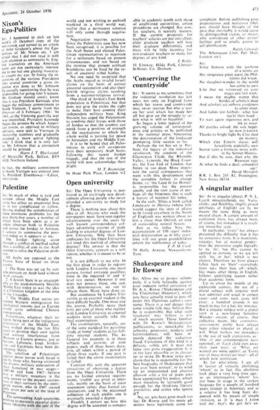A singular matter
Sir: In re singular/plural, P. N. L. Lycett misapprehends me. Varia- ability and flexibility (highly-prized attributes of English) arc by no means the same thing as mere mental chaos. A certain amount of confusion there has always been, of course, but nowadays it is reach- ing forest-fire scale.
In particular. 'every' has always presented the difficulty that it has no possessive form. It is manifestly singular, but of neutral gender: thus the possessive ought logically to be 'its', but this cannot be applied to persons, so we are left with 'his or her, which is too clumsy. Therefore we have always fallen back on 'their'—everybody must take their hats off—which, like many other things in English, follows underlying reason rather than academic form.
Up to about the middle of the eighteenth century. the use of a plural subject with singular verb was admitted and usual in certain cases—and some such cases still exist: a hundred pounds is too much to pay for a hat. for instance. But a singular subject with a plaal verb is a new-found Spineless Wonder—except, of course, that collective nouns like co ;;;;;; ince. government, public have always been either singular or plural at will. What bothers me nowadays is the use of such expressions as: 'Otte of our correspondents have reported', or 'Each child puts away their own toys', or 'What are wanted are some apples. or 'Every one of these stories-ore true—all of which now proliferate As for who/whom. I am all in favour of virtually abolishing 'whom' as in fact this abolition took place a very long time ago: as an interrogative 'whom' has not been in usage in the spoken language for a couple of hundred years (except in America), and as a relative it has long been dis- pensed with by means of simple omission. as in 'a man I know told me'. that's thc girl he's en-
gaged to', and so on. The current use of 'who' in such cases is not merely bad grammar, it is a wholly perverse re-creation of a problem that had already been sensibly dealt with. But what's worse, this coin- cides with a sudden determination to continue using 'whom', but only in cases where it makes gram- matical nonsense: ' ... whom they say is in America' for instance.
The Order of the Cake and Biscuit with bar should go to the newscaster who achieved a stagger- ing double with 'A lawyer who we consulted explained that people whom he believes are liable ...' So we consulted he and were told that them are liable—O tempora, o lingual S. F. Hagan c/o National Book League, 7 Albe- marle Street, London wl















































 Previous page
Previous page